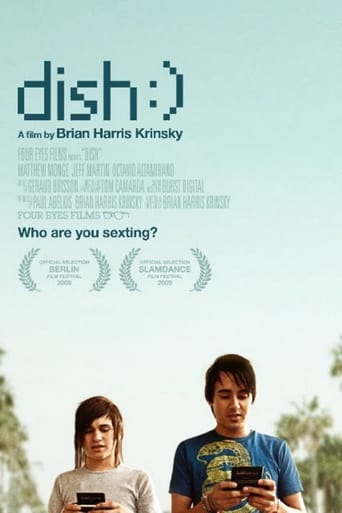lorenzo212
Israel is a 15 year-old Emo kid. Like millions of teens before him, who kept back pocket combs in the 50's, long hair in the 60's, wild hair in the 70's, and on and on, he is obsessed with his hairstyle more than anything else, as it seems to define his ambiguous life position - inexperienced, still virginal, and thus innocent by today's standards. But that doesn't mean he isn't seeking new worlds - which he does through the modern day method of texting messages. Most people he contacts seem to share the same concerns teens have shared forever - who's doing who - the ritual to the beginning of coming of age. Israel and his friend, Louie, hang out for a while, where Louie shares sex stories to seem to push Israel off his butt and out there to do something, almost so Louie's point of life at that moment would be justified. And Israel seems to be on that road when he meets Ricky, an older, more experienced teen. The film captures the emptiness of many youth, unsure and stepping either carefully or recklessly into adulthood. The addition of texting provides a shared "we are all on the journey" support mechanism, that makes each step a little easier as youth reaches for solutions and actions that are beneficial for life or just momentary experiences. Israel is played by Matthew Monge, with an endearing simplicity that paints a touching picture of innocence, fragility, and playfulness, tempered by a realization that our paths are really only our own.
Arcadio Bolanos
One could often see the Hispanic community as a group of outsiders, thus embodying the condition of the subaltern. But what happens when inside this outcast community, there is further marginalization? Brian Harris Krinsky's short film focus on Israel, a young Hispanic boy, around 15 years old, who happens to be immersed in the era of virtual communication, text messaging and IM. He has but two deeply rooted obsessions: one is to be constantly "connected" via a smart phone, and the other is to take care of his hair. The first one gives him, as well as millions of people, the illusion of being indeed connected and communicated with the world. Nonetheless, this is but a simulacrum of real human rapport. The second one is actually a symptom. Symptoms are the manifestations of a profound psychological or social malaise.When Israel and his friend Louie hang around they can only talk about one thing: sex, or rather gay sex. Israel feels uneasy about partaking in sexual intercourse, especially anal, while Louie tries to convince him and tells him how much he will come to enjoy it. As Israel affirms, he feels like everyone is simply rushing into it. And this is comprehensible, after all they are young and like Louie tells him sex can be great.Israel receives text messages all the time and that's how he finds out who is sleeping with whom. We cannot fathom what kind of perpetual orgy he imagines, but when he meets Ricky, an 18 years old kid, he decides it's time to lose his virginity. At the moment of truth, however, there is an excision. Israel is somewhat aware of the fissures in society's structure, but he still confides in his instant messaging as the 'end' and not the 'means' of communication. Thus, deprived of his cell phone, interacting with Ricky will become difficult. There is also the symptom, Israel's perfectionism regarding his hair. Sex is a sweaty and messy business, and it sure won't do any good to his hairdo. What then? Will this truly be Israel's first time or society's malaise could come through once again as the symptom?



